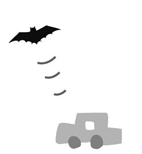



iBatsiIndicator Bats Programjmonitors
bat populations globally by listening to the sound bats use to navigate and
find food. It is a partnership project between the Zoological Society of London
and the Bat Conservation Trust and began in 2006.
iBats currently has ongoing acoustic
bat monitoring projects in the UK, Eastern Europe, Ukraine, Russia and Japan
involving hundreds of volunteers. Also, the projects are expanding with a
number of pilot projects in other countries around the world.
We have held an iBats workshop every year
since 2010 at different locations in Japan. So far, 47 volunteers have been
trained and more than 125 events have been conducted.
We hope that we will have more volunteers and
we also hope to make use of iBats-Japan data for bat conservation in future.
Besides iBats project, acoustic
monitoring is attracting attention in various research fields in Japan. Bat
capture surveys with mist-nets and harp traps have their limits as they tend
to catch those species that fly low and their capture rate is not high. So if we could identify bats by
their calls unique to the species, it could be an effective tool to study bat
fauna and we could suggest more credible bat conservation plan. It is
also important to assess environmental impact of wind turbines which is getting
a big concern now. At the moment we donft have a proper bat research manual due
to the lack of basic bat information. In the future, we hope we will be able to
make the bat research manual similar to the BCT manual gDetermining the
potential ecological impact of wind turbines on bat population in Britain, 2009h.
This project is supported by the Japan Fund for Global Environment from
the Environmental Restration and Conservation Agency.@
@